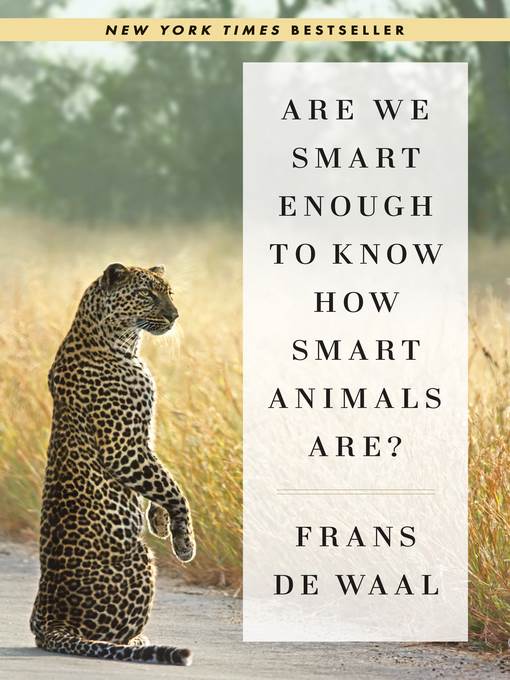
Are We Smart Enough to Know How Smart Animals Are?
کتاب های مرتبط
- اطلاعات
- نقد و بررسی
- دیدگاه کاربران
نقد و بررسی

Starred review from February 1, 2016
In this thoroughly engaging, remarkably informative, and deeply insightful book, de Waal (The Bonobo and the Atheist), a primatologist at Emory University in Atlanta, investigates the intelligences of various animals and the ways that scientists have attempted to understand them. The book succeeds on many levels. De Waal provides ample documentation that animals—including the primates he studies, other mammals, octopuses, birds, and even insects—can be remarkably adept at solving problems. He also explains scientists’ experimental protocols, discussing how bias can creep into experiments and lead to erroneous conclusions. Reiterating Charles Darwin’s “well-known observation that the mental difference between humans and other animals is one of degree rather than kind,” de Waal augments the scientific perspective with a historical one, carefully considering the debates that have roiled the field of animal behavior science for over a century. He describes how chimps collaborate to evade electrified wire and how bonobos occasionally carry tools in anticipation of needing them in the future, telling fabulous stories that shed light on the differences and similarities between humans and other animals. Emphasizing the forms of animal “empathy and cooperation” he has long studied, de Waal teaches readers as much about humankind as he does about our nonhuman relatives. Illus.

Starred review from February 15, 2016
Intrigued by the search for intelligent life? No need for space travel--it's happening right here on Earth, and the results are amazing. De Waal (Psychology/Emory Univ.; The Bonobo and the Atheist: In Search of Humanism Among the Primates, 2013, etc.), the director of the Living Links Center at the Yerkes National Primate Research Center, tells us that it takes human ingenuity and respect to comprehend the level of intelligence of an animal. In example after example, he entertainingly demonstrates how researchers with those qualities have revealed surprising things about animal cognition and the porousness of the wall between human and animal cognition. First, for the nonscientist, the author provides some background on scientific thinking about animal behavior, putting paid to the bygone notion that animals are simply stimulus-response mechanisms or are solely driven by genetically endowed instincts. In recent years, scientists have begun to recognize the many surprising abilities of animals. The author's field is primate behavior, and most of the examples come from that field, but elephants, octopuses, squirrels, and magpies are among the many other animals to appear in these pages. He shows us many animals both in the wild and in captivity solving challenging problems, planning future actions, having better-than-human memories, making and handling tools, communicating, and demonstrating empathy and cooperation. De Waal is persuasive in arguing that the difference between the cognition of the human and those of other animals is one of degree, not of kind, and the clarity of his writing makes for a highly readable book. A welcome bonus is the inclusion of rather charming, simple drawings by the author that give the essence of an activity better than a photograph might. For general readers, he includes a helpful glossary, and for those who want more details about the research cited, there is an extensive bibliography. After this edifying book, a trip to the zoo may never be the same.
COPYRIGHT(2016) Kirkus Reviews, ALL RIGHTS RESERVED.

Starred review from April 1, 2016
Author of many influential books on primate social behavior and intelligence, de Waal (psychology, Emory Univ.; director, Living Links Ctr., Yerkes National Primate Research Ctr., Atlanta; The Age of Empathy) here takes a critical look at the history of his own field, now called "evolutionary cognition." Combining the best research practices from two opposing scientific disciplines--ethology and comparative psychology--he seeks to understand animals on their terms rather than ours. Easier said than done, however. As de Waal points out, devising species-appropriate intelligence tests requires a great deal of smarts on our part. But it seems that the better we get at testing animals, the more knowledgeable they appear to be. Drawing upon personal experiences, anecdotes, and research findings from a broad range of animal cognition studies, de Waal brilliantly addresses the enormous amount of skepticism and criticism that has plagued this discipline. VERDICT This insightful and fascinating work by a scientist who has been at the forefront of new thinking about primates and what it means to be human is highly recommended. De Waal fans and general readers interested in the field of animal cognition will be delighted.--Cynthia Lee Knight, Hunterdon Cty. Historical Soc., Flemington, NJ
Copyright 2016 Library Journal, LLC Used with permission.

























دیدگاه کاربران